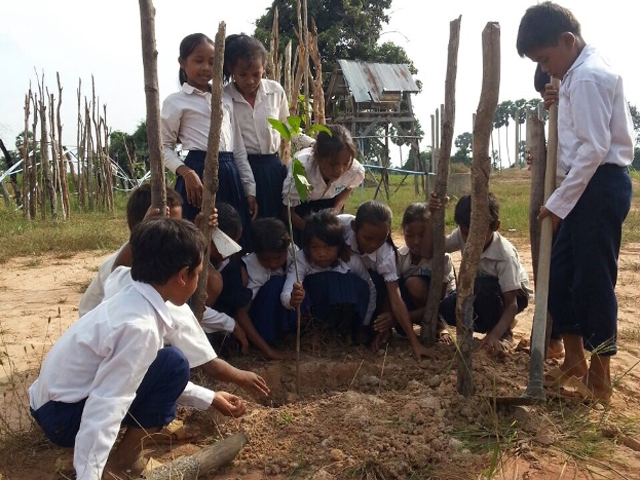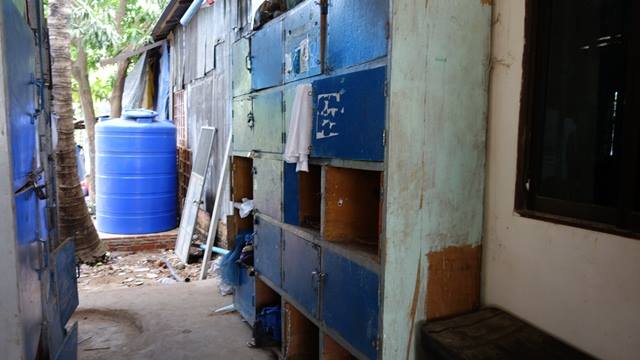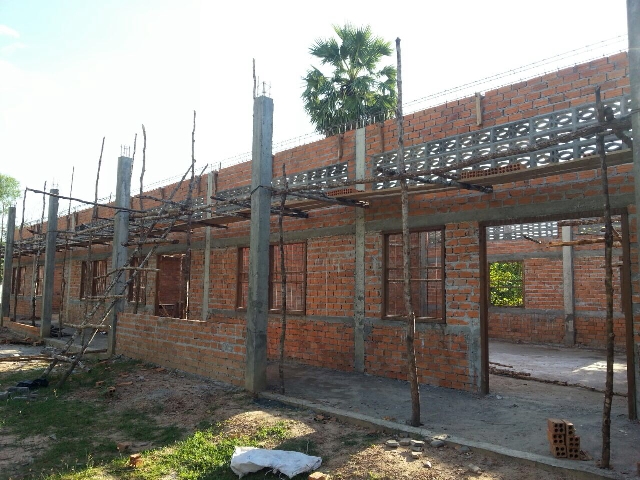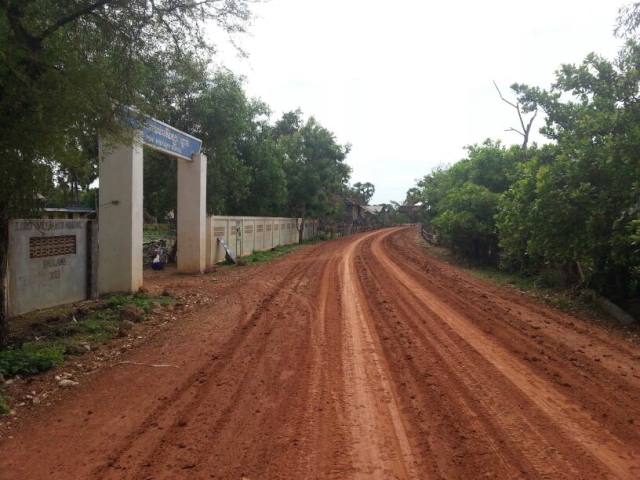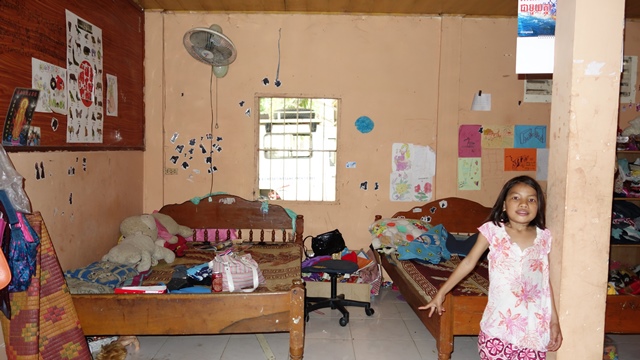Please note news from the Pichey Rangsey school can be viewed under the 'news' section of our website.
The Pichey Rangsey school is located within the Pouk Ressey village, 23 kilometres north of Phnom Penh on the east bank of the Mekong River. The original primary school lay within the grounds of the local Buddhist Temple. It was constructed in 1993 (funded by Khmer people from Sihanoukville) from bullet damaged timber salvaged from a Khmer Rouge kitchen where the entire village had to eat during the regime. The project proponent for the new school, Denzil Sprague, had been living in Cambodia for five years. Denzil is an aviation administrator from Australia who originally came to Cambodia to help establish an airline. In the years that followed he became engaged with the Khmer community and was introduced to a struggling brick factory at Pouk Ressey. The brick factory was verging on bankruptcy. To fend off aggressive debt collectors, Denzil purchased the factory and entrusted village elders to oversee the smooth running of the facility. With more efficient management, expansion and productivity, the factory soon employed 40 locals.
Since the region has no other industrial activities, survival of the brick factory was of paramount importance to the villagers. Children of employees are not permitted to work at the brick factory. They are encouraged to attend the local school and Denzil initially purchased the children's school uniforms and some bicycles for transportation. Soon after Denzil became involved with the village, he was approached by the monks of the local pagoda in which the old school stood, who asked for his help in replacing its buildings, which were unsafe, unsanitary and in urgent need of repair. The school had been built soon after the defeat of Pol Pot, when available building materials were scarce and inferior. Indeed, the timber still showed bullet and shrapnel damage. The monks owned land across the road, adjacent to the pagoda, and agreed to donate it for a new school if Denzil would pay the necessary expenses. He willingly assumed that responsibility.
Construction began in January 2008 and by mid 2009 three buildings, each containing 5 classrooms, together with toilet blocks, were finished, and occupied by the students of the former school. The new classrooms were dramatically different from the dark, damp and depressing ones of the old school, where there were no toilets or sufficient playing area. Once the grounds were landscaped with a roadside wall and classic Khmer gateway, they were safer and more appropriate for the children's games.
Pichey Rangsey school was officially opened by the Cambodian Minister of Education, together with the then Ambassador of Australia, Margaret Adamson, in May 2010 before a crowd of 3000 people. Subsequently and in recognition of his services to education and to Cambodia Denzil was awarded the medal, Commander of the Royal Order of Monisaraphon.
A strategic alliance has been established between Melbourne's Caulfield Grammar and the Humanitus Foundation, which have both greatly assisted Denzil's efforts for the children's welfare and enjoyment of their time at school. Caulfield Grammar Primary School students have already raised funds to pay for bicycles, uniforms,a health care program and school equipment and this funding will also help with the development of the playing area and the introduction of sports, all of which will be a new experience for the students and teachers. Electricity has now been connected to the school, making possible the setting up of computer training classes and the display of overhead projection material.
The children's poor general health was an urgent problem and was affecting their general wellbeing and ability to concentrate and participate in classes. The introduction of a health program in January 2011 resulted in all children being assessed to determine their particular health status and needs. Nearly two thirds were found to be underweight for their age and malnourished, and many had tooth decay and other related dental problems. Parasite control was considered essential, as their proximity to domestic animals had exposed the children to parasites from birth. Vitamin A supplements were also given, as well as personal and dental hygiene information. These measures have already greatly improved the students' physical appearance and attentiveness, and a follow up medical examination six months later showed that the proportion of those who were initially underweight had reduced from 64% to 32% - a significant decrease considering the minimal treatment given.
Denzil is also well aware of the extent to which human trafficking flourishes in Cambodia and the dangers it poses for the country's young population. It is estimated that up to 200 under age children are stolen every week in Phnom Penh. Predators prey on the naivety of children from poor provincial villages, offering them well paid "jobs" in the city, something the Pouk Ressey community became aware of recently when a teacher brought the plight of a female grade 6 student to Denzil's attention. She was prevented from working in Phnom Penh and both the school director and a Khmer lawyer subsequently and at Denzil's request, spoke to the children about their human rights, the dangers of drug abuse, human trafficking and pedophilia. One of the risk factors for young Cambodians is the chronic shortage of skills and employment opportunities available to them, which is exacerbated by the large numbers (200,000) of high school pupils graduating at Years 9 and 12 each year. More vocational training tailored to the needs of the business industry in all fields is needed and to this end Denzil is exploring the possibility of extending the Pouk Ressey primary school campus to include vocational training at Years 7 to 9. The teaching of English in grades 5 and 6 has also been formalized in tandem with a policy which is currently being introduced in Government Schools throughout Cambodia. These initiatives will not only prepare students for employment positions, but should reduce the numbers of those dropping out of the secondary education system to help in the family business, or becoming prey to traffickers.
Denzil Sprague's policy is to continue the progress and development of the Pichey Rangsey school by adding facilities that will enhance the children's education. He is a strong believer that a strong emphasis on the education of children is the fundamental element in the future development of any country, even more so in Cambodia where recent historical events so tragically decimated the social structure. Denzil believes that his work in building the school has laid a sound foundation from where further development must provide the basic amenities, facilities, equipment and improved academic building blocks that these children have been denied.
Please follow this link to read about the official opening of Denzil Sprague's school on 10 May 2010



